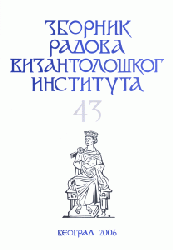Slovenski antroponimi u sudskim aktima Dimitrija Homatina
Slavic Anthroponyms in the Judicial Decisions of Demetrios Chomatenos
Author(s): Dejan DželebdžićSubject(s): History
Published by: Vizantološki institut SANU
Keywords: anthroponym; Demetrios Chomatenos; judicial decisions;
Summary/Abstract: The present paper deals with personal names mentioned by Demetrios Chomatenos which can with some certainty be identified as Slavic in origin. For the greater part, these are well-known Slavic names, often of Common Slavic origin, also attested in other Slavic languages. A couple of uncommon names is also attested, such as Svinjilo and Svinja. Among the names of non-Slavic origin, it is the Saints' names that are most commonly found, but some others are attested as well, like Kuman, Sarakin or Kandid, all of them well known among the South Slavs. The Slavonic ethnicity of the carriers of these names can as a rule be established by tracing their family relations. In the course of the 11th and 12th centuries, family names became quite common and stable in Byzantium, at least with aristocratic families. As first noted by Jacques Lefort, some paroikoi on the territories belonging to the monasteries of the Holy Mountain had family names, too, but these tended to appear sporadically and to disappear after some time. Demetrios Chomatenos' judicial decisions show that at that period family names were carried by the majority of the inhabitants of Byzantine Macedonia, Epirus and other regions (including women, sometimes even monks), not only the members of the elite. However, the Slavic population of these regions still often stuck to the ancient custom of naming a person only with a personal name, sometimes supplemented by a patronymic. This notwithstanding, more than twenty persons did have, apart from their Slavic name, another one, usually of Christian origin. Although the data do not always allow for an unequivocal identification of the functions of each of these names, it can be safely assumed that they are not instances of double personal names, but rather that the name of Christian origin functions as a personal name, the Slavic one as a family name. This is quite certain for the family of Svinjilos from Berroia (Ponem. Diaph. 81) and very probable for the family of Ljutovojs from Skoplje...
Journal: Зборник радова Византолошког института
- Issue Year: 2006
- Issue No: 43
- Page Range: 483-499
- Page Count: 16
- Language: Serbian

